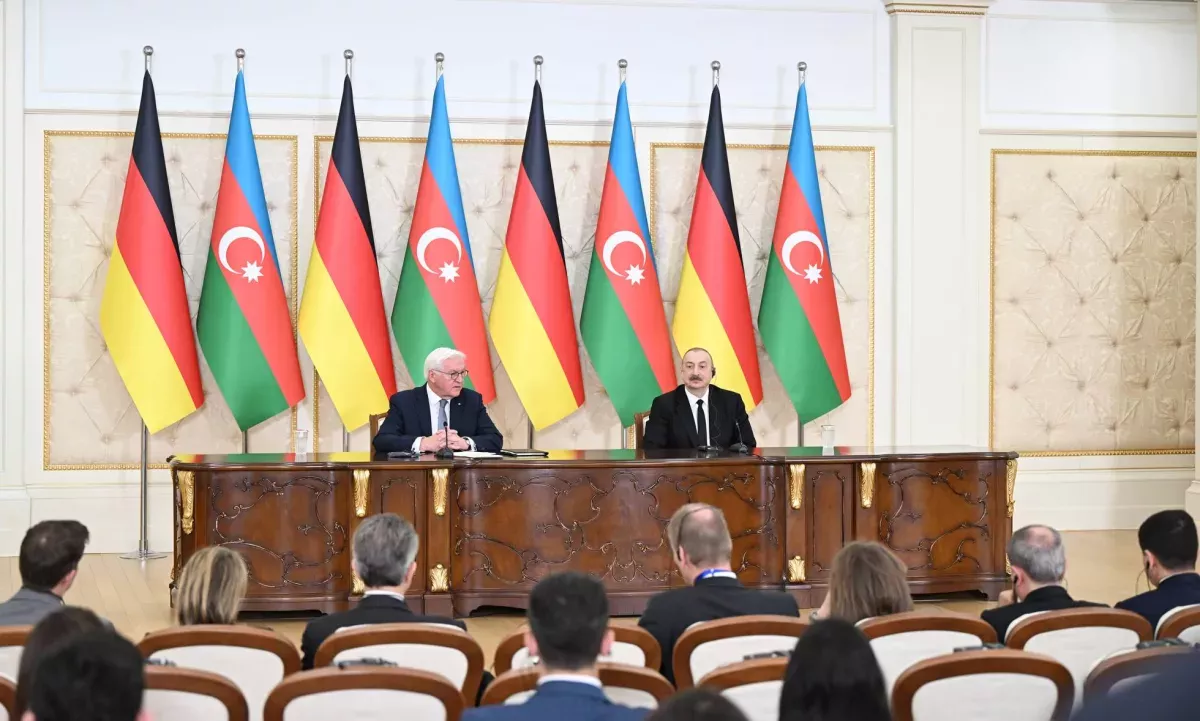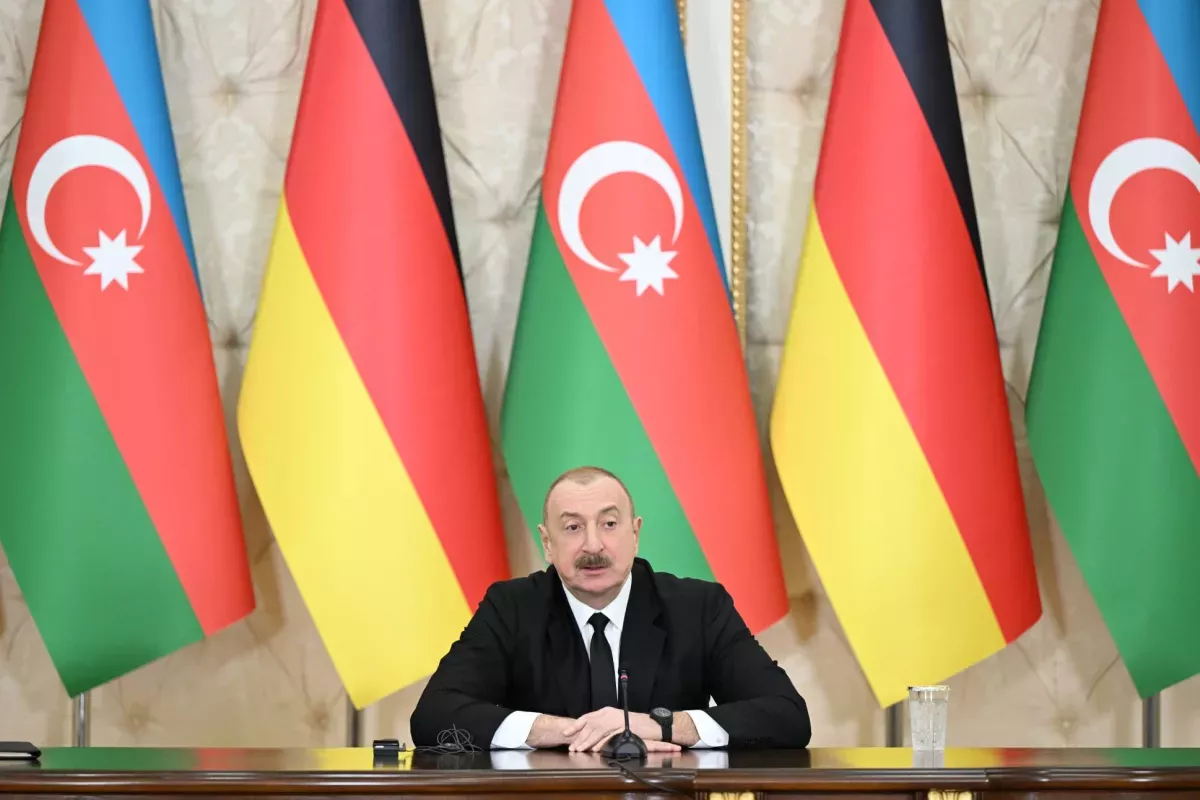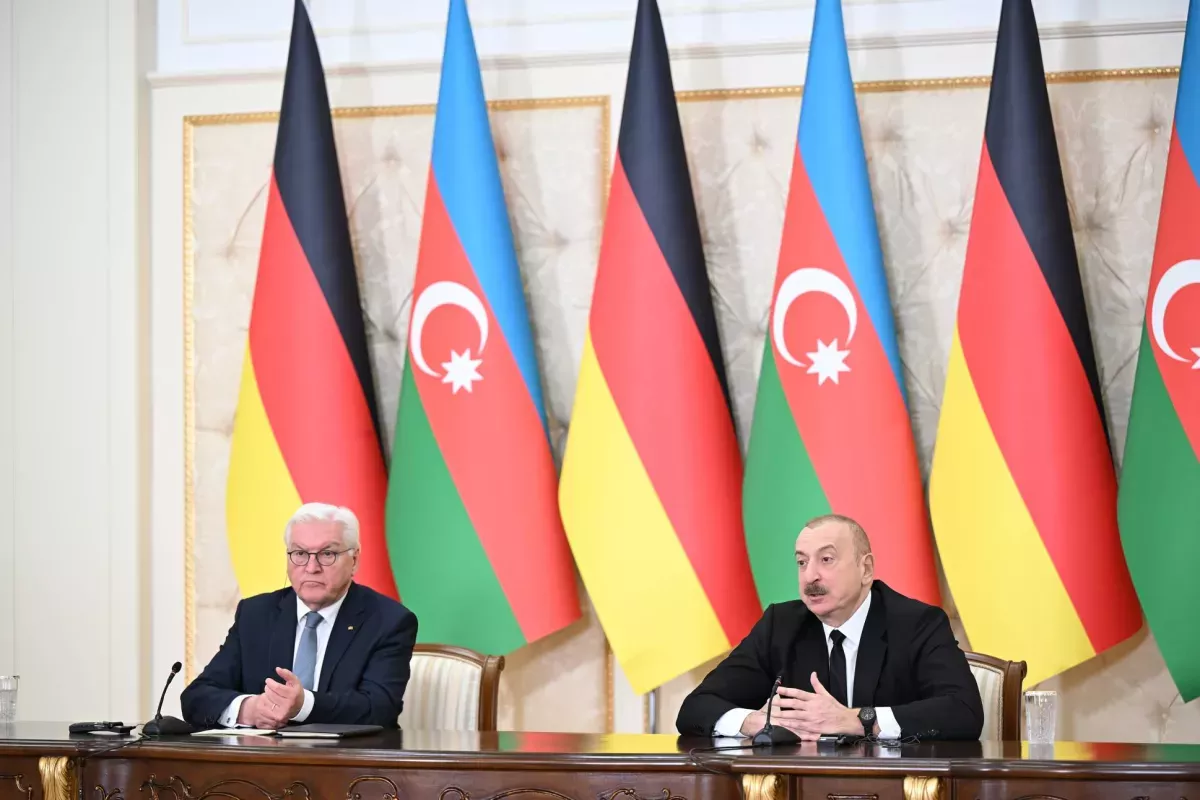Lessons from Baku for Berlin The outcomes of Steinmeier’s visit to Azerbaijan
How German officials love to disavow themselves, especially in relation to the South Caucasus. Moreover, this is often done through unprofessional and ahistorical assessments of the realities in the region. This is exactly what many were thinking in the run-up to the official visit to Azerbaijan by the President of Germany, Frank-Walter Steinmeier, which was preceded by a scandalous incident involving a post during his stay in Armenia. It is worth recalling that a provocative text related to the Karabakh region of Azerbaijan was published in the story on Steinmeier's official Instagram page, accompanied by an image of a piece of dusty cloth once presented by Armenian separatist criminals as the so-called "flag" of the operetta "NKR." This naturally caused displeasure in Baku, leading to an apology from the German president's administration to the Azerbaijani side, alongside the removal of the post.
In light of the recent incident, a similar situation from just over two years ago came to mind. In early March 2023, during a press conference in Germany following a meeting with Armenian Prime Minister Nikol Pashinyan, German Chancellor Olaf Scholz stated the necessity of achieving a peaceful resolution between Armenia and Azerbaijan "in terms of the territorial integrity of both countries, as well as the right to self-determination of the people of Nagorno-Karabakh." Naturally, this moment triggered a negative response from Baku, and as a result of prompt diplomatic efforts by Azerbaijan, the German government immediately declared Berlin's recognition of "territorial integrity within the internationally recognized borders of Armenia and Azerbaijan." A few hours later, Scholz's controversial statement was removed from the official website of the chancellor. In the subsequent negotiations with Azerbaijani President Ilham Aliyev, Scholz emphasized that the foundation for a peaceful settlement should be the principle of recognizing the territorial integrity of both Azerbaijan and Armenia.
Indeed, it's quite interesting, isn't it? This sort of biased Berlin continuity in the South Caucasus vector, where, in both instances, official German entities (figures) offered apologies.
Regarding the German president's visit to Azerbaijan, it seems worthwhile to touch upon some nuances in his press statement and responses to journalists, starting with the economic component. First and foremost, Steinmeier highlighted Azerbaijan's significant role for Germany in 2022, when gas supplies from Russia to Germany began to be interrupted. The German president stated, "I am very glad that Azerbaijan has developed into an important place. Very important trade routes pass through your country, which, in turn, can serve as a basis for the unification of the world. We have talked about our economic and trade relations. Your country plays a role in Germany's trade relations not only with Central Asia, but also with the Far East, including Southwest Asia and China. We know that the possibilities of the existing roads are limited. The roads passing through your country, as well as the role of the Middle Corridor, are important for the German economy and represent a good prospect. This will be even more interesting.”

In the context of Steinmeier's statement, it is worth noting that the topic of the Middle Corridor, also known as the Trans-Caspian International Transport Route (TITR), is of immense relevance for the entire European continent. This is confirmed by the fact that, just a few days ago, at the 20th meeting of the Foreign Ministers of Central Asian countries and the European Union in Ashgabat, the EU High Representative for Foreign Affairs and Security Policy, Vice-President of the European Commission, Josep Borrell, also emphasized the importance of the Middle Corridor. She highlighted the "at least twofold increase in cargo transportation across the Caspian Sea." She defined the TITR as "not only a trade artery but also a strategic project that strengthens economic ties between Central Asia and the EU." Following this, she announced the readiness of European and international financial institutions to invest more than 10 billion euros in the development of this transport route.
Another thing is that in reflection of the Middle Corridor, Steinmeier also spoke in the spirit of how the attractiveness of the route will be highlighted in even brighter colors in case of more stable development of the South Caucasus “from a political point of view”. Who would have doubted, but perhaps it was this emphasis that the German President should have fixed in Yerevan, not in Baku, because President Ilham Aliyev has repeatedly emphasized the importance of peace, stability and security in the South Caucasus region. He emphasized this yesterday as well, saying that the positions of Azerbaijan and Armenia in achieving peace have sufficiently converged at the present time.
Indeed, the point Steinmeier made regarding the Middle Corridor is noteworthy, particularly his suggestion that the route's appeal would become even more pronounced with the more stable political development of the South Caucasus. Who could doubt this? However, it seems that this is exactly the emphasis the German president should have made in Yerevan, rather than in Baku. After all, Azerbaijani President Ilham Aliyev has repeatedly emphasized the importance of peace, stability, and security in the South Caucasus. He reiterated this just yesterday, mentioning the significant rapprochement between Azerbaijan and Armenia at present in terms of their positions on achieving peace.
Another aspect is that Steinmeier heard firsthand about the importance of Yerevan’s positive implementation of two key issues on the path to a peace agreement: the abolition of the notorious OSCE Minsk Group and amendments to Armenia's constitution, which openly state territorial claims against Azerbaijan under the guise of "annexing the legitimate historical territory" of our country. Azerbaijani President Ilham Aliyev clearly outlined this as a "legitimate demand." However, he noted that Yerevan’s practical disagreement with the closure of the de facto non-functioning OSCE Minsk Group "rightfully raises suspicions" in Baku, especially in the context of whether Armenia may again seek "territorial claims against us." This is particularly concerning given that Yerevan, in unison with "provocations from France, is rapidly arming itself," while some forces try to present Armenia as a "dove of peace."

Then, the head of state, emphasizing the commendable "evolutionary process" in Pashinyan’s stance, pointed out that while the Armenian leader had previously stated, "Karabakh is Armenia, and that's it," today he proclaims, "Karabakh is Azerbaijan." Considering the special fondness of official Yerevan, regardless of who is in power, for what could be called "football diplomacy," President Aliyev noted that "the ball is now in Armenia's court." If Armenia is truly committed to signing a peace agreement, he stressed, "it must accept these two legitimate conditions."
It is also worth noting that President Ilham Aliyev responded brilliantly to Steinmeier's scandalous post. As he emphasized, there was no such thing as the so-called "NKR," which Yerevan insisted on including in the peace agreement by January 2024, because it "only existed in the imagination of Armenia." Summarizing this part of his speech, he pointed out that after the Second Karabakh War, when Baku "restored international law on the battlefield and in the political arena" (despite the lack of serious steps by international organizations in this regard), "Azerbaijan and I personally became the initiators of the peace talks." Meanwhile, Armenia and the still-functioning OSCE Minsk Group did not hesitate to make their proposals, just as biased external circles ignored the ethnic cleansing of Azerbaijanis carried out by Armenian occupiers and the fact that nearly 20% of Azerbaijani lands were under occupation.

In this direction, President Ilham Aliyev expressed confidence that the results of the first-ever official visit of the German president to Azerbaijan would "further bring our countries closer together," noting that the economic achievements, particularly the nearly threefold increase in trade turnover in January-February of this year, were "naturally inspiring." Additionally, the head of state emphasized that Baku had significant programs in the renewable energy sector, "where German companies have vast experience." By the way, if German Foreign Minister Annalena Baerbock had been more attentive to the agenda during her participation in COP29, without being distracted by other aspects unrelated to this crucial forum for all of humanity, she could have conveyed detailed information to her president about Azerbaijan's potential in the field of renewable energy sources (RES).
In light of the situation, we can only hope that, just as Chancellor Olaf Scholz did in 2023, both President Frank-Walter Steinmeier yesterday took into account the realities in the region, which are based on Azerbaijan's achievement of historical justice in accordance with all norms and principles of international law. Furthermore, we hope that no more negative comments will be made by German officials regarding the South Caucasus, based on ignorance of the past and current situation in the region. Especially since, as the German president himself emphasized yesterday: "We know and acknowledge that the Karabakh region is the territory of Azerbaijan. This is our position."








